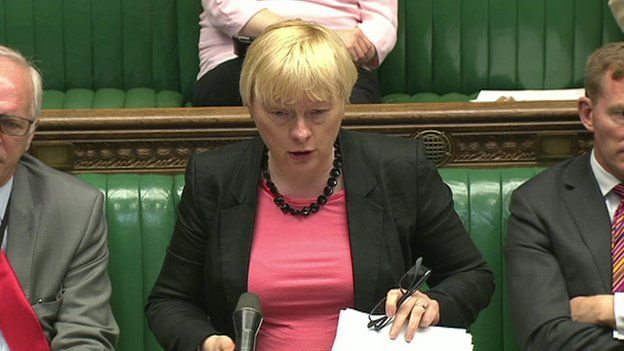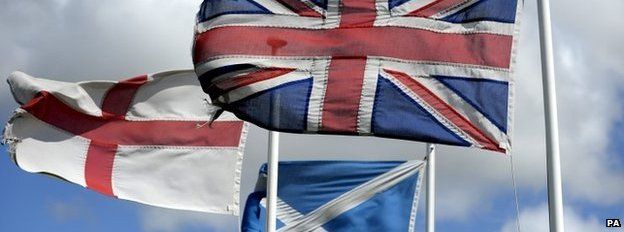The government will give MPs from English constituencies a new "veto" over laws affecting England only.
Commons Leader Chris Grayling said the change, also applying in some cases to Welsh MPs, would bring "real fairness to our constitutional arrangements".
MPs will vote, for the first time, with tablet computers in some cases where the "double majority" system applies.
Labour said it was an "outrage" that ministers wanted to rush into making "profound constitutional change".
Shadow Commons leader Angela Eagle said the plans risked creating two classes of MPs and accused the Conservatives of a "cynical" attempt to "manufacture itself a very much larger" majority in the Commons.
Under the
proposals, all MPs would continue to vote on all key stages of legislation.
But English MPs - and in some cases English and Welsh MPs - will have a veto in Westminster when debating matters that have been devolved to the devolved administrations.
Labour's Angela Eagle criticised the 'back of a fag packet' proposals
MPs will debate the changes on 15 July, Mr Grayling said, and the system will be changed using the rules - known as
standing orders - that dictate how Parliament conducts its business.
With more powers set to be devolved to the Scottish Parliament after September's independence referendum, Tory MPs have said it is not right that MPs representing Scottish constituencies can continue to determine laws affecting England only.
Mr Grayling told MPs that Scotland, Wales and Northern Ireland were getting a "stronger voice" and that it was "only fair" to do the same for England.
The Speaker will be asked to certify which bills or parts of bills relate to England or England and Wales only, he said.
New system
- The Speaker will judge which parts of a bill relate to just England, or England and Wales
- An England-only committee stage will consider bills deemed "England-only in their entirety"
- Membership of this committee will reflect the number of MPs each party has in England
- Where sections of legislation relate only to England or England and Wales, agreement of a "Legislative Grand Committee" will be required
What is the 'English Question'?
There will be no changes in the House of Lords, Mr Grayling said. But where Lords amendments are certified as England or England and Wales only, a "double majority" system applies, meaning it will need a majority of both the whole House of Commons and MPs representing English or English and Welsh constituencies.
Tablet computers will be used so MPs can instantly register whether they have used their veto where the "double majority" rule applies.
To jeers from opposition benches, Mr Grayling said "Today we are answering the West Lothian Question", a reference to the constitutional anomaly that lets Scottish, Welsh and Northern Ireland MP at Westminster vote on measures that only apply in England.
West Lothian Question
- Many powers - like education - have been devolved from Westminster, and are the responsibility of the Scottish, Welsh and Northern Irish governments
- In 1977 Labour MP Tam Dalyell - the MP for West Lothian - highlighted what he saw as a dilemma caused by devolution: that Scottish MPs would carry on voting on English issues but English MPs wouldn't have a say on matters in Scotland
- He said it was absurd that he was able to vote on matters affecting the English town of Blackburn, Lancashire, not Blackburn, West Lothian, which was in his own constituency
- Debate over the anomaly has intensified with the new powers being handed to Scotland following its independence referendum
The SNP's Pete Wishart described the English votes policy as a "cobbled together unworkable mess", and said it was "totally unacceptable".
He said this policy showed that the Tories were doing their best to ensure Scotland would become an independent country.
Labour's Sir Gerald Kaufman, the father of the house, said the title of the motion, English votes for English laws, "sounds racist".
He added: "This government is undermining the whole basis of British democracy, right through from when the Magna Carta was signed."


 This actually sounds like a great idea.
This actually sounds like a great idea.

